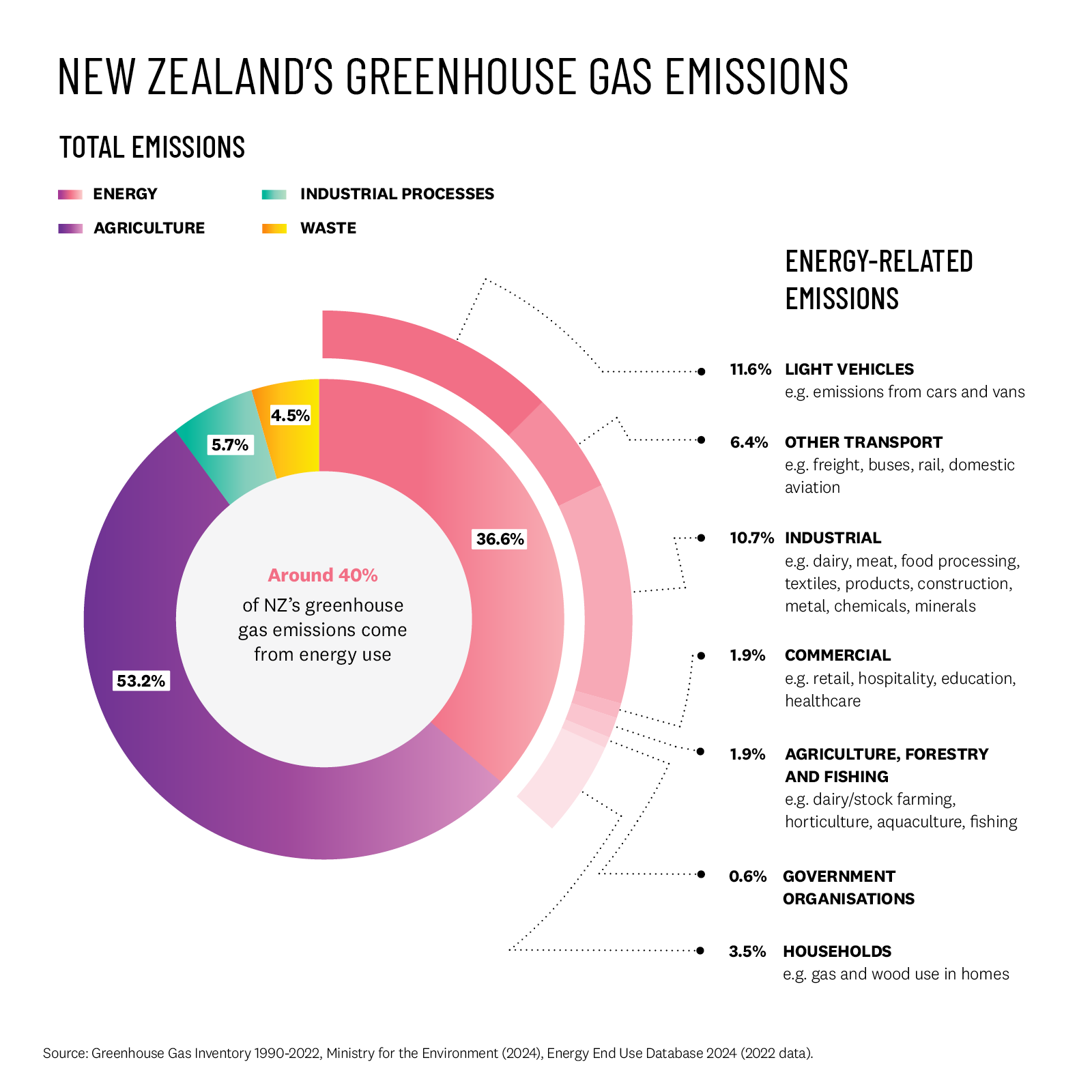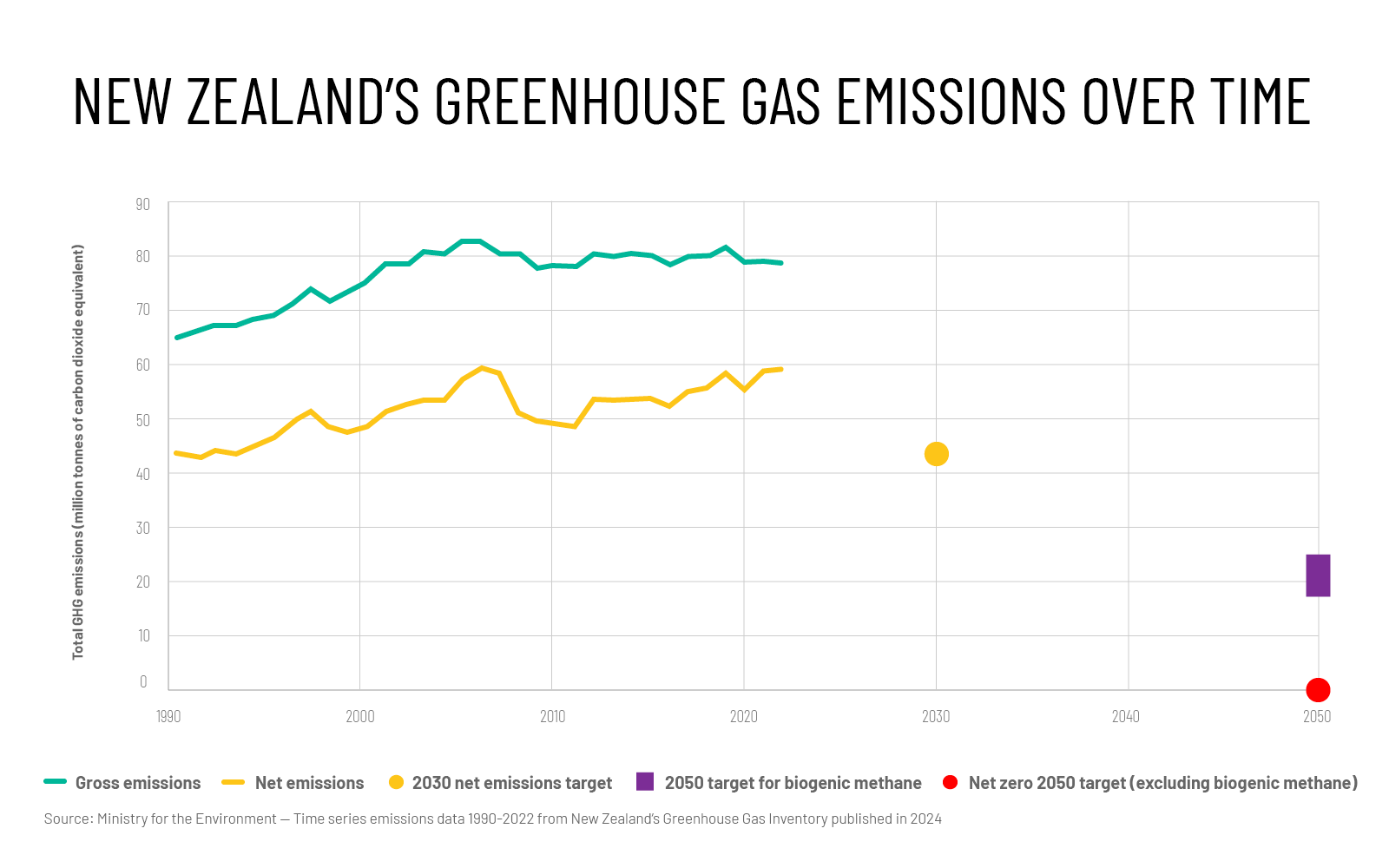Climate change and our energy use
Climate change is directly caused by our energy choices. In New Zealand, our energy use makes up around 40% of our greenhouse gas emissions.
Those emissions are created when we burn fossil fuels – driving a petrol car or diesel truck, travelling by plane, burning gas for manufacturing or burning coal to create electricity.
A snapshot of New Zealand's energy-related emissions
- 49 %
from transport
- 40 %
from business
- 10 %
from our homes
New Zealand's emissions reduction targets
New Zealand has a commitment to reaching net-zero carbon emissions by 2050. This is a legislated target, which means it is set in New Zealand law.
Learn about the Climate Change Response Act(external link)
We've also committed to reducing net emissions to 50% below gross 2005 levels by 2030. This target is our first target under the Paris Agreement, a legally binding international treaty that New Zealand signed onto in 2015 along with 194 other countries.
Learn more about the Paris Agreement(external link)
In order to reach our targets, the Government’s plan is set out in its Emissions Reduction Plan(s). You can find more information about this on the Ministry for the Environment’s website.
Net vs gross emissions
- Gross emissions are our total greenhouse gas emissions from human activity.
- Net emissions include any removal of carbon dioxide from the atmosphere through land use and forestry.
To reach net zero, we need to significantly reduce our GHG emissions, and offset any remaining emissions through removal of excess carbon dioxide from the atmosphere.
Biogenic methane is not included in our net zero target – we have a separate target for these emissions. Biogenic methane is produced by animals in agriculture, and from organic waste breaking down in landfill. Methane has a separate target because it breaks down more quickly in the atmosphere, which means there is a level of methane emissions that does not lead to global warming.
The latest data
New Zealand's Greenhouse Gas Inventory is produced each year as part of Aotearoa New Zealand’s obligations under the Paris Agreement and United Nations Framework Convention on Climate Change (UNFCCC). The Ministry for the Environment compiles and submits the inventory to the UNFCCC.
The inventory year is 15 months behind the current calendar year to give countries time to collect and process the inventory data and prepare the submission.
The language of climate change
Climate change itself is complicated, and the language used to talk about it is no different. We've put together a guide to help explain some of the words and phrases around climate change, from greenhouse gases and carbon offsetting, to the Paris Agreement.
The breakdown of our emissions
Around 40% of New Zealand's greenhouse gas emissions come from the energy sector, including light vehicles, manufacturing and construction, other transport, and electricity generation. The rest of our greenhouse gas emissions come from agriculture, waste, and industrial processes.

Climate change and the electricity grid
Get a better understanding of New Zealand's mostly-renewable electricity system, and why the time of day we use electricity makes a difference.
Helpful resources
There's a lot of great information out there on climate change, whether you want to learn more about the science, learn how it’s impacting us, find out what the government is doing, or discover what you can do.
- Climate action for everyone — discover the actions you can take in your home, transport, and everyday life.
- Climate action for businesses — learn more about running a low-carbon business.
- Ministry for the Environment(external link) — find out more about the science and evidence for climate change, and what New Zealand is doing.
- The Forever Project(external link) — Stuff's climate change hub, covering the latest issues around climate change and how they’re affecting New Zealand.
- Ministry for Business, Innovation and Employment(external link) — find out more about the transition to a low emissions economy and renewable energy.
- FutureFit(external link) — calculate your own carbon footprint and discover ways you can reduce your impact.
- Climate Action Toolbox(external link) — a tool that gives small and medium businesses tailored advice on how to reduce their impact.
Continue reading
-
Calculate your carbon footprint
Understanding your carbon footprint is a great place to start when it comes to tackling climate change.
-
The electricity grid
Why the time of day we use electricity makes a difference.
-
The Emissions Trading Scheme explained
Find out how the Emissions Trading Scheme works and what impact it has on you.

